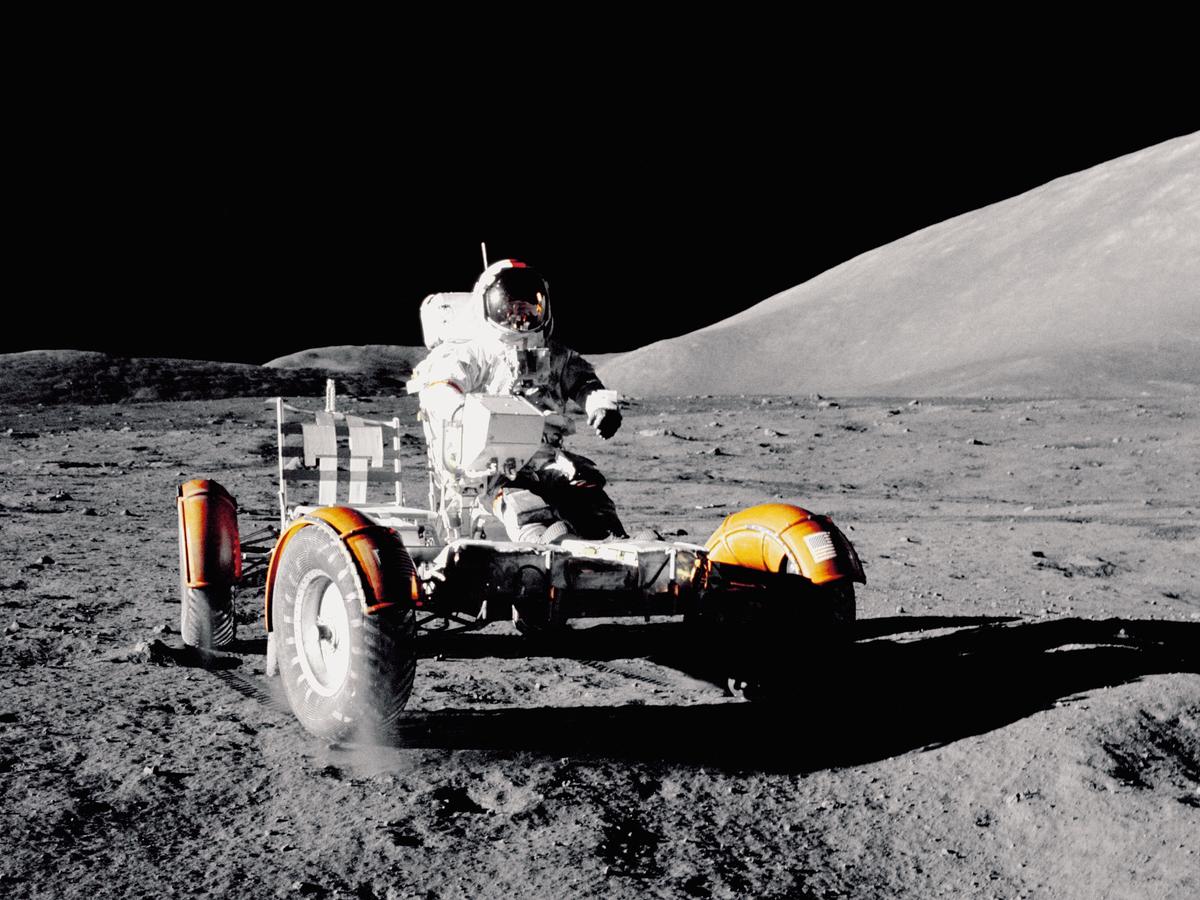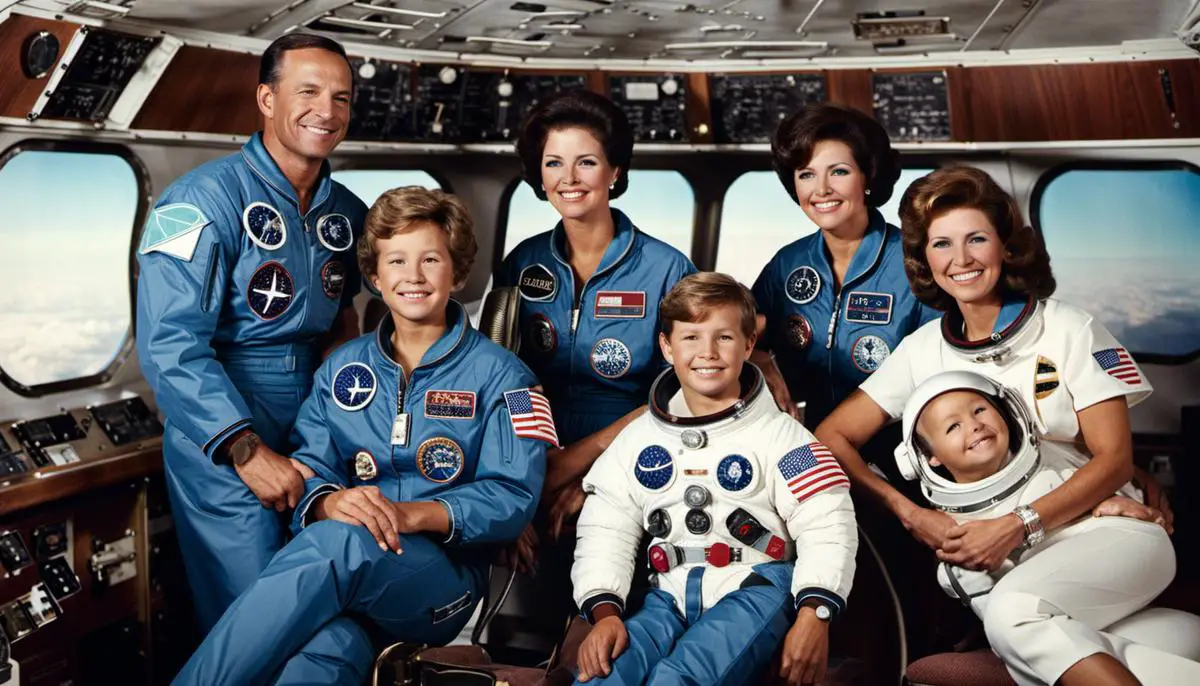Space exploration, as magnificent and groundbreaking as it may be, holds a widely untold story – the story of the families left on solid ground. The Apollo missions, the pinnacle of human achievement, not only sent men to the moon but also created a ripple effect on the lives of those connected to the astronauts. This essay uncloaks the ostensibly normal pre-mission lives of the Apollo astronauts’ families, bringing to the fore, the family dynamics, routines and customary lives led before their loved ones embarked on this extraordinary journey. The focus will further pivot to the impact the missions had on the families, magnifying the emotional and psychological adjustments they had to make in dealing with long periods of absence and the attendant risks of space travel. A noteworthy point of discussion will be the effect of public scrutiny and the role of media during these times, and the effects of the resultant fame on the families.
Contents
Pre-Mission Lives of Apollo Astronauts’ Families
Apollo Astronauts’ Family Dynamics
Before their commitment to the Apollo missions, the astronauts led lives similar to the other American families of their era, albeit with some added stress due to the nature of their profession. Many of these astronauts were military officers, test pilots, and engineers. As a result, their families often had to endure long periods of separation and the fear of losing their loved ones considering the high risk involved in their job. Despite the risks and challenges, these families remained united through shared purposes.
Occupations and Routines of Apollo Astronauts’ Families
Apart from the astronaut himself, his wife and children usually lived a normal American family life, with the wives often adhered to the mid-20th-century norm of not working outside the home to focus on raising the kids. They organized family activities, helped with homework, and ensured a stable home environment despite the uncommon and often stressful work of their husbands.
Despite hectic and unpredictable work schedules, the Apollo astronauts made efforts to balance their work and home life. They would spend time with their families when they weren’t training, often taking them for an outing or simply spending quality time at home. Also, they understood the importance of education and continually encouraged their children to aspire for academic excellence.
Lifestyles and Children’s Upbringing in Apollo Astronauts’ Families
The wives and children of the Apollo astronauts lived under a distinctive lens, subject to publicity and scrutiny. It was common for journalists to camp outside their homes, particularly during missions, to get exclusive updates or comments. Thus, the wives often had to bear the additional responsibility of dealing with the media and maintaining a brave face during times of crisis.
During these times, women like Pat White, Janet Armstrong, and Joan Aldrin, among others, became unwitting national figures symbolizing the courage and sacrifice of American families. The upbringing of children in these families also significantly differed. Despite attempts to maintain normalcy, the children often faced challenges separate from their peers. They had to contend with the absence of their father due to intensive training schedules and the looming fear of an impending disaster during missions.
Though faced with unique pressures and exceptional challenges, the families of Apollo astronauts maintained a solid, supportive foundation that empowered their loved ones to conquer their extraordinary tasks. Their lifestyle before the mission prepared them for substantial changes that would be triggered by space travel and the subsequent fame and recognition that ensued.

Impact of Mission on Astronauts’ Families
The Training Process and Its Impact on Family Life
The rigorous training involved in preparing for the Apollo missions necessitated extended separation from family. This training consisted of thorough physical workouts, acquiring complex technical skills, and undergoing psychological evaluations, with the goal of ensuring the astronauts’ resilience against the physical and psychological demands of space travel. Due to the intensity of this training, astronauts found themselves away from home for weeks or even months at a time. Consequently, their spouses had to single-handedly address family responsibilities, manage the household, and sometimes, even handle the media frenzy associated with being an astronaut’s family.
Risks associated with the Missions
Undoubtedly, one of the greatest strains on an astronaut’s family was the knowledge of the risks and unknowns associated with space travel. Every Apollo mission carried significant risks – equipment failure, accidents during launch or landing, and the many unknowns of traveling in space. These were realities that the families had to regularly grapple with. Personal letters and accounts reveal the constant undercurrent of fear and worry that was a part of their daily lives. This had a monumental emotional impact, causing stress, anxiety, and uncertainty in everyday activities.
Coping with Emotional and Psychological Challenges
For the spouses and children of Apollo astronauts, the missions often came with a set of unique emotional and psychological challenges. With the public spotlight on them, these families often felt significant pressure to portray an image of strength and unity. They navigated these pressures while dealing with the constant worry for the safety of their loved ones millions of miles away in space. Spouses had to stay strong for their children, and children felt the weight of the situation, which could often manifest as behavioral changes or anxiety.
Post-mission Adjustments
Made public by recent interviews with astronaut families, the time following the astronaut’s return from space also presented its own issues. Having been away for a significant length, families had to readjust. Astronauts were reintegrating into a household that had learned to function without them, which sometimes led to conflicts. Furthermore, having lived through an extraordinary experience, some astronauts found it challenging to transition back to the routines of daily domestic life.
Implications and Long-term Effects
Over the long term, the families of Apollo astronauts faced various challenges. Some endured marital troubles due to the strain that the missions had put on their relationships. Others struggled with the public fame that came with their association with the Apollo missions. For some children of Apollo astronauts, the early impact of their parents’ career influenced their own career choices, with many opting for fields related to space, science, and technology.
Digging into the archives of letters, individual accounts, and captivating interviews highlights the profound effects that the Apollo missions had on the families of its astronauts. The wives and children at home had to adjust to simultaneously managing daily routines without their astronaut family member while wrestling with the constant fear and anxiety that comes with the dangerous unpredictability of outer space missions. Both psychological and practical challenges had to be faced and overcome during this time, demonstrating that these families, though on Earth, undertook separate but distinctively parallel journeys in comparison to their astronauts in space.

Public Scrutiny and Media Influence on Apollo Astronauts’ Families
The Apollo Astronauts’ Families and Their Battle with Public Attention
In the aftermath of NASA’s spotlighted Apollo program, the astronauts were overnight transformed into public sensations. The unexpected fame affected not just the astronauts, but also permeated into their familial lives, triggering a drastic shift in their everyday routine. A wave of media attention swarmed around the astronauts’ families as the wider public tried to satisfy their curiosity about the household lives of these emblematic figures. This intense exposure saw each family member, from spouses to the smallest children, in the very center of public attention, posing a significant challenge in maintaining a sense of normalcy and safeguarding their private lives amid the sudden glare of celebrity.
Impact of Media Portrayal
The media portrayal of astronauts’ families significantly shaped public opinion. They were often depicted as the quintessential American family, smiling and uncomplaining as they supported their astronaut relatives. Images of happy, wholesome families helped to cement the astronauts’ heroic status.
Meanwhile, this representation imposed an additional burden on families. They were expected to uphold this idealized image, a situation that was often at odds with the reality of having a family member who faced extreme danger as part of their profession. The weight of these expectations was particularly heavy on the astronauts’ wives, who were frequently in the media spotlight.
Families Handling the Spotlight
Astronaut families demonstrated remarkable resilience amidst the public scrutiny and media attention. They found ways to cope with their unique circumstances, often through mutual support and bonding with other astronaut families who shared similar experiences. Learning to negotiate with the media also became a significant part of their lives, as they strived to protect their personal space and maintain some semblance of normalcy.
The astronaut wives, in particular, had an essential role in handling the spotlight. There was an unspoken understanding that these women had to maintain a composed and supportive demeanor, regardless of their fears and anxieties. They stood as pillars of emotional strength, supporting their husbands’ careers while managing their households and children’s lives under the relentless media and public scrutiny.
The lives of the families of Apollo astronauts were profoundly marked by public scrutiny and media influence. Nor were these external challenges the only ones they faced; their own personal and family experiences, unique and intense, also formed a significant part of the human story of the Apollo program. Yet, through it all, their strength and resilience shone as a testament to their character.

Post-Mission Family Lives of Apollo Astronauts
Post-mission life necessitated significant adjustments for both the Apollo astronauts and their families. Upon their return, the astronauts were suddenly catapulted into stardom, tasked with managing a rigorous schedule packed with media interviews, public appearances, and official obligations. The sudden influx of fame and attention exerted a considerable influence not only on their lives but also on those of their family members.
Simultaneously, readjusting to the domestic routine proved to be a challenge as astronauts transitioned from the extraordinary life in space to the ‘ordinary’ ebb and flow of life on earth. This period, filled with adjustments and immense experiences, called for the families to unify and support each other in understanding the significance of their achievements and the inherent changes that came along with it.
Challenges Faced by the Families
The mental and physical strain on the astronauts and their families was significant. As they were reintegrated into society, the astronauts experienced difficulties in adjusting to regular routines off the spaceship. Meanwhile, their spouses and children were often thrust into the public eye, coping with intrusive press attention and the pressure of maintaining a public image.
For the family members, adjusting to the lifestyle changes and managing the intense scrutiny were among the primary challenges. The world’s attention was centered on their astronaut family members; hence, their every move was watched and traced. This public attention sometimes resulted in intrusion into their private spaces—resulting in an increased level of stress and anxiety for the families.
Changes in Family Dynamics
The post-mission period also saw significant changes in the family dynamics of the Apollo astronauts. With the astronauts traveling frequently for promotional events and interviews, their spouses often had to assume the majority of household responsibilities. They had to handle parenting duties alone and manage household tasks while dealing with their spouses’ absenteeism.
Children, on the other hand, faced the challenge of understanding the magnitude of their parent’s achievements whilst adjusting to their frequent absences. Many astronaut spouses reported feelings of isolation and pressure to project a polished exterior in light of the public scrutiny.
Long-Term Effects and Achievements
The families of Apollo astronauts did face long-term psychological and social effects from the mission aftermath. High levels of stress during and after the mission had the potential to trigger depressive episodes and other mental health issues. However, it also allowed them to form stronger bonds by collectively adapting to the changes.
Despite the difficulties, the Apollo families found ways to continue their life journey with resilience. The astronauts were committed to contributing to science and humanity even after the curtains of the Apollo program closed. Many translated their experiences to successful careers in academia, politics, or other fields—Buzz Aldrin, for instance, became a prominent advocate for space exploration. Their spouses and children, too, were inspired to make their mark, often pursuing successful careers of their own.
In summary, the post-mission lives of the Apollo astronauts and their families were marked by significant adaptation and resilience, as they navigated the unique challenges and pressures inherent in such a monumental achievement.

Although we often celebrate the majestic feats of the Apollo missions, it is pivotal to recognize the unsung heroes in this narrative: the families of these astronauts. They navigated a unique set of obstacles, from coping with the anxiety of their loves ones’ high-risk endeavors to managing the oftentimes unwanted attention brought about by media coverage. The transition to post-mission life also posed its set of unique challenges, altering the family dynamics and propelling them into a new normal. Their experiences, their ability to find the equilibrium between public adulation and private struggles, and their resilience in the face of extraordinary circumstances draw a compelling narrative to be appreciated and understood. By studying these lives, we soar beyond the spacecraft, and delve into the humanism of space travel, shedding light on the remarkable strength and endurance the human spirit is capable of under extreme circumstances.
